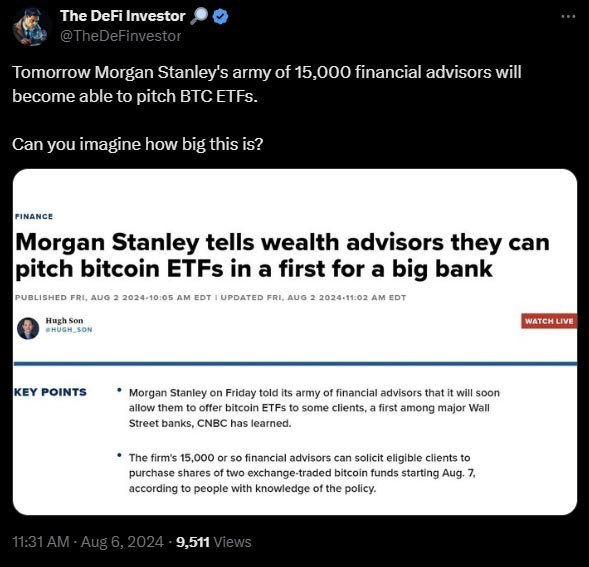Morgan Stanley, the largest wealth manager in the United States, recently made headlines with its bold decision to offer Bitcoin exchange-traded funds (ETFs) to its high-net-worth clients.
This move, seen by many in the Bitcoin community as a significant step towards the mainstream adoption of digital assets, has not come without its fair share of controversy.
Former U.S. Securities and Exchange Commission (SEC) official John Reed Stark has been particularly vocal about the potential regulatory challenges that Morgan Stanley may face as a result of this decision.
Earlier this month, Morgan Stanley announced plans to allow its 15,000 licensed financial advisors to begin pitching Bitcoin spot ETFs to their clients. Specifically, the firm is endorsing two Bitcoin ETF products: BlackRock’s iShares Bitcoin Trust (IBIT) and Fidelity’s Wise Origin Bitcoin Fund (FBTC).
These ETFs are designed to give investors direct exposure to bitcoin’s price without requiring them to hold the asset directly.
However, this offering is not available to just anyone. It is specifically targeted at individuals with a net worth of $1.5 million or more and a high tolerance for risk.
This high threshold reflects the volatile nature of bitcoin, which can experience significant price swings in a short period of time.
While the move has been praised by some within the digital asset community as a major milestone, John Reed Stark, a former chief of the SEC’s Office of Internet Enforcement, has issued a warning to Morgan Stanley.
In a post on social media platform X, Stark described the bank’s decision as a “death wish” in terms of regulatory scrutiny. Stark wrote:
“By unleashing its legion of 15,000 brokers to pitch Bitcoin, Morgan Stanley has just voluntarily subjected themselves to what will likely become the largest SEC and FINRA examination sweep in history.”
He warned that the SEC and the Financial Industry Regulatory Authority (FINRA) would now have near-instantaneous access to all records related to Morgan Stanley’s bitcoin sales to retail investors. This includes documents, emails, texts, voicemails, and phone conversations.
Stark believes that the move will lead to intense regulatory scrutiny, with SEC and FINRA compliance and enforcement staff having the ability to demand and inspect this treasure trove of evidence at any time, whether through a formal request or an unannounced on-site inspection.
“Identifying violations will be like shooting fish in a barrel. So whoever Morgan Stanley’s current compliance director is — well, good luck with that,” Stark added ominously.
The concerns raised by Stark are not without merit.
The SEC and FINRA are known for their rigorous enforcement actions, particularly when it comes to ensuring that financial institutions comply with securities laws and regulations.
By offering Bitcoin ETFs, Morgan Stanley may have opened itself up to an unprecedented level of regulatory oversight.
Stark’s warnings highlight the challenges that Morgan Stanley’s compliance department is likely to face. The firm will need to ensure that all of its brokers are fully aware of and comply with the various rules and regulations governing the sale of Bitcoin ETFs.
This will be no small feat, given the complex and rapidly evolving nature of Bitcoin regulation in the United States.
Moreover, the fact that Morgan Stanley is one of the first major Wall Street banks to offer Bitcoin ETFs on such a large scale means that regulators will likely be watching closely to see how the firm handles this new venture.
Any missteps could result in significant penalties and damage to the bank’s reputation.
Morgan Stanley’s move is part of a broader trend among major financial institutions to embrace Bitcoin. As the demand for digital assets continues to grow, more and more banks are looking for ways to offer their clients exposure to this emerging asset class.
Wells Fargo, another major Wall Street bank, is also expected to start offering Bitcoin ETFs to certain investors in the near future. This growing interest from traditional financial institutions is seen as a critical factor in the mainstream adoption of bitcoin.
As more banks and investment firms begin to offer Bitcoin-related products, the scarce digital asset is likely to gain greater legitimacy and acceptance among mainstream investors.
Related: BlackRock Sees Growing Interest from Institutional Investors in Bitcoin ETFs
However, this increased interest also comes with increased scrutiny.
As more financial institutions enter the Bitcoin space, regulators are likely to ramp up their efforts to ensure that these new products are being offered in compliance with existing laws and regulations.
The introduction of Bitcoin ETFs by major financial institutions like Morgan Stanley is a significant milestone for the market. It signals a growing acceptance of digital assets within the traditional financial system and could lead to increased investment in bitcoin.

Since the approval of spot Bitcoin ETFs in January, the market has seen significant inflows of capital. According to data from Farside Investors, Bitcoin ETFs experienced a net inflow of $239.7 (approximately 4000 BTC) million on August 7 and 8.
BlackRock’s iShares Bitcoin Trust (IBIT) saw inflows of 3501.6 BTC (valued at $210.1 million) and currently holds 347,608 BTC, worth approximately $21 billion. These numbers reflect the strong demand for Bitcoin ETFs among institutional investors.
Despite the optimism surrounding Bitcoin ETFs, the regulatory landscape remains uncertain. Bitcoin regulation is still in its early stages, and there is no comprehensive framework in place to govern the sale and trading of digital assets.
This lack of clarity has led to a somewhat contentious relationship between financial institutions and regulators.
The situation is further complicated by the current political climate in the United States. With a presidential election looming, there is uncertainty about how Bitcoin regulation might evolve in the coming years.
Some experts believe that if Donald Trump returns to the White House, his administration might adopt more favorable policies toward digital assets. However, it remains to be seen how this will play out.










